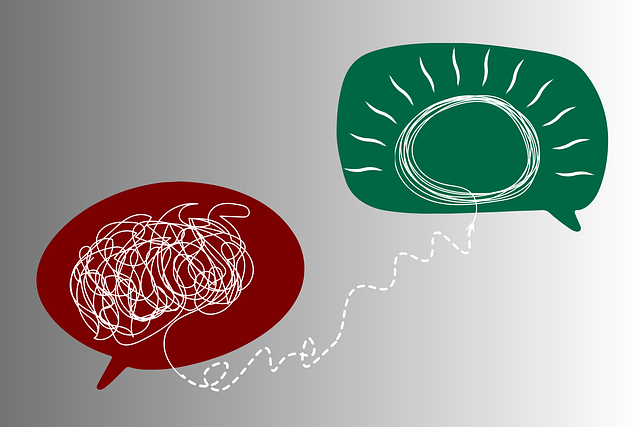Therapy tailored for Russian-speaking children addresses cultural and linguistic barriers, focusing on teaching coping skills to manage stress and anxiety. These sessions incorporate native language, evidence-based techniques like CBT, mindfulness training, and self-awareness exercises to build resilience. By empowering parents with communication tools and mental wellness coaching, these programs bridge access gaps, fostering better emotional regulation for long-term well-being.
Coping skills development is a vital aspect of mental health, especially for children. This comprehensive guide explores various strategies and techniques to help young individuals navigate stress, anxiety, and challenging situations. We delve into understanding coping skills, the therapeutic role in fostering mechanisms, and unique considerations for Russian-speaking children overcoming language barriers. Additionally, we provide practical tips for clinical settings and a parent’s guide to building resilience at home.
- Understanding Coping Skills for Children
- The Role of Therapy in Developing Coping Mechanisms
- Language Barriers and Russian-Speaking Children's Coping Strategies
- Techniques to Enhance Coping Skills in a Clinical Setting
- Building Resilience at Home: A Guide for Parents
Understanding Coping Skills for Children

Understanding Coping Skills for Children
Coping skills development is a crucial aspect of therapy for children, especially those who speak Russian as their first language. In today’s diverse and often stressful world, it’s essential to equip young minds with tools to navigate emotional challenges effectively. The process begins by teaching children to recognize and acknowledge their feelings, a fundamental step towards emotional regulation. Through simple yet powerful techniques, they learn to express their emotions in healthy ways, reducing the reliance on problematic behaviors.
Russian-speaking therapists play a vital role in facilitating this journey by offering tailored therapy sessions that address specific cultural nuances. By incorporating activities that promote resilience building and anxiety relief, children gain confidence in managing stressful situations. These coping skills not only enhance their overall well-being but also foster a sense of self-efficacy, empowering them to face future challenges head-on.
The Role of Therapy in Developing Coping Mechanisms

Therapy plays a pivotal role in helping children, especially those from Russian-speaking backgrounds, develop effective coping skills. Through tailored sessions, therapists facilitate a safe space for kids to express their emotions and work through challenging experiences. By employing evidence-based techniques such as communication strategies and compassion cultivation practices, therapy empowers young individuals to navigate stress and adversity healthily.
Russian-speaking children often face unique cultural and linguistic barriers when accessing mental health support. Therapists who are proficient in both the child’s native language and culture can offer specialized care. They employ tailored approaches that consider family dynamics and community influences, ensuring the coping mechanisms learned are culturally relevant and sustainable. Additionally, these therapists may incorporate Stress Reduction Methods to teach kids mindfulness and relaxation techniques, further bolstering their ability to cope effectively with life’s challenges.
Language Barriers and Russian-Speaking Children's Coping Strategies

Many Russian-speaking children face unique challenges when it comes to coping skills development due to language barriers. Growing up in a new country with a different linguistic environment can significantly impact their ability to express emotions and seek support. These barriers often hinder effective communication with mental health professionals, as specialized therapy for children speaking Russian may not be readily available. As a result, such children might resort to less adaptive coping strategies to navigate their emotional struggles.
Mental wellness coaching programs designed for this specific demographic can play a crucial role in addressing these issues. By incorporating development activities focused on self-awareness exercises and burnout prevention, coaches can help Russian-speaking children build resilience. These programs aim to bridge the gap by providing a safe space where children can learn to articulate their feelings, fostering better coping mechanisms. Through tailored support, these youngsters can enhance their mental wellness and develop healthy habits that will benefit them in the long term.
Techniques to Enhance Coping Skills in a Clinical Setting

In a clinical setting, enhancing coping skills for children involves tailored techniques that cater to their unique needs and cultural backgrounds. For Russian-speaking children, therapy sessions can be enriched by incorporating their native language and culturally relevant activities. This approach not only facilitates better communication but also builds trust and comfort, making it easier for them to express their emotions and challenges openly. Techniques such as cognitive-behavioral therapy (CBT) have proven effective in teaching children age-appropriate coping strategies to manage stress, anxiety, and other emotional difficulties.
Public Awareness Campaigns Development plays a crucial role in promoting emotional regulation skills among Russian-speaking communities. Educational initiatives that target parents and caregivers can equip them with the knowledge and tools to support their child’s emotional well-being. By integrating emotional regulation techniques into these campaigns, we can foster a broader understanding of mental health and encourage earlier intervention, ultimately enhancing coping abilities within these communities.
Building Resilience at Home: A Guide for Parents

Building resilience at home is a crucial aspect of fostering healthy development in children, especially those from Russian-speaking backgrounds who might face unique challenges. Parents play a vital role in teaching their kids valuable coping skills and helping them navigate life’s storms. Through open communication, it’s possible to create a safe space where children feel comfortable expressing their emotions. This involves actively listening without judgment and validating their feelings, which can be enhanced through therapy for children with Russian as their first language.
By incorporating Mind Over Matter principles, parents can empower their children to overcome obstacles. Teaching them to reframe negative thoughts and focus on solutions builds a mental framework that supports depression prevention. Regularly assessing risk factors and seeking professional guidance when needed, such as from mental health professionals specializing in Russian-speaking communities, ensures early intervention. This comprehensive approach equips both parents and children with the tools necessary to enhance resilience and overall well-being.
Coping skills development is an essential aspect of mental health, especially for children. By understanding and implementing various techniques, such as those discussed in this article, parents, caregivers, and therapists can empower kids to navigate challenges effectively. The role of therapy, tailored for Russian-speaking children, plays a significant part in enhancing coping mechanisms, addressing language barriers, and fostering resilience. With the right tools and support, children can develop healthy strategies to cope with stress, anxiety, and other emotional difficulties, leading to improved well-being and a brighter future.









